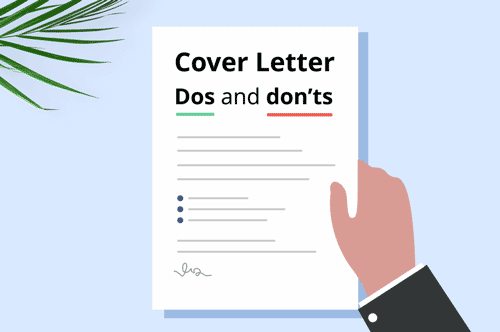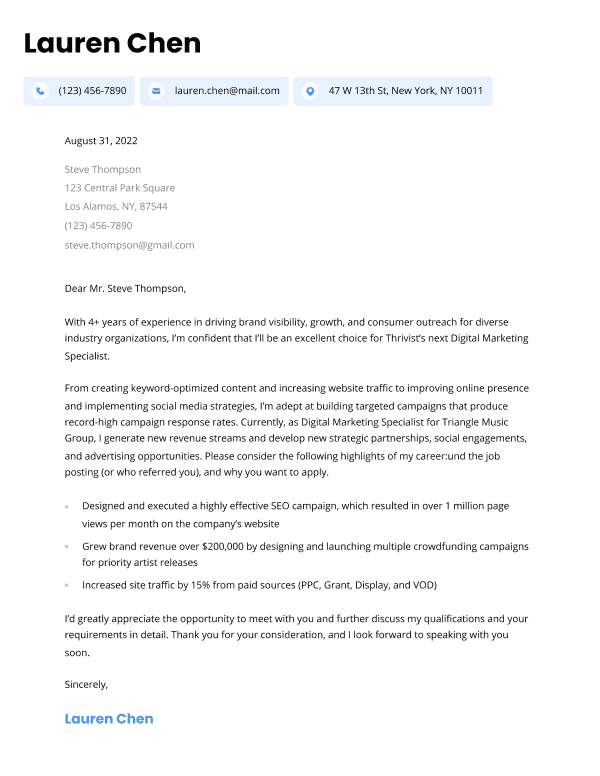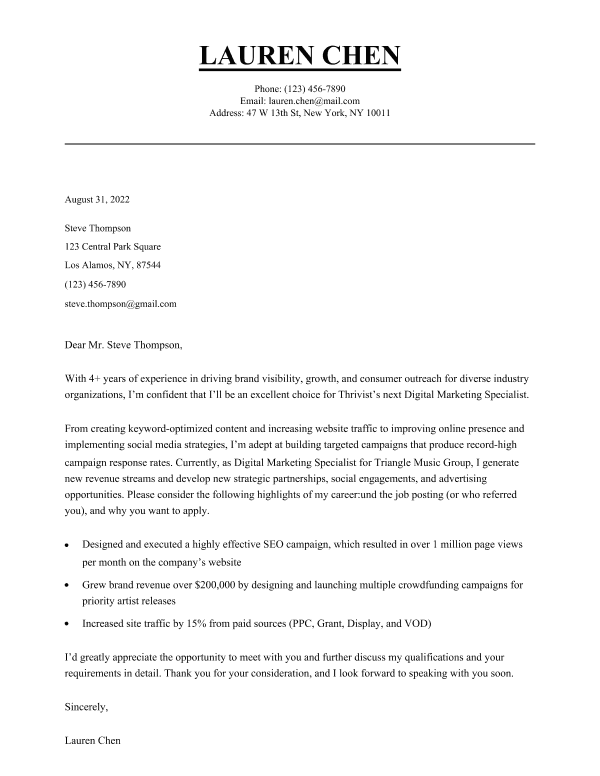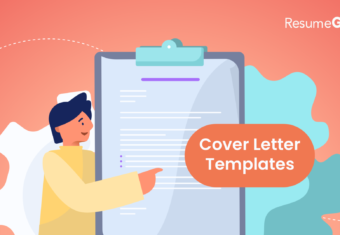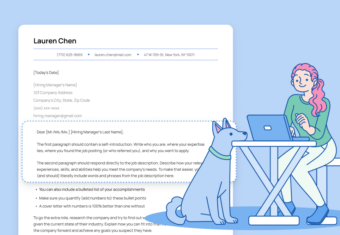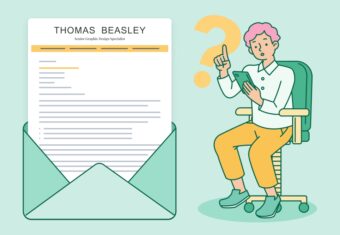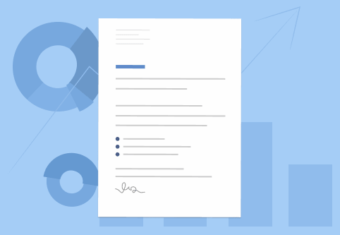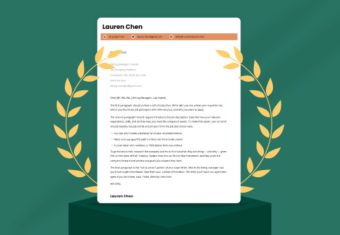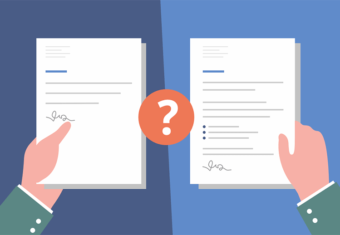10 Cover Letter Dos and Don’ts
Writing a great cover letter isn’t easy. With a whole page to elaborate on your qualifications, it’s hard to know what to focus on (or not to focus on) to make the best first impression possible.
Here are 10 cover letter do’s and don’ts to help you avoid mistakes and put together a killer cover letter that properly highlights your passion, skills, and experience to employers.
Our free-to-use cover letter builder can make you a cover letter in as little as 5 minutes. Just pick the template you want, and our software will format everything for you.
Cover Letter Don’ts
Here are some common cover letter practices that are best avoided:
Don’t start your cover letter with “To Whom It May Concern”
Generic cover letter salutations like To Whom It May Concern are off-putting and considered awkward by many hiring managers.
Nowadays, it’s easy to personalize your cover letter by finding the hiring manager’s name on LinkedIn or the company website. Using To Whom It May Concern gives the impression that you didn’t try to tailor your cover letter or are sending out generic applications, which can put off some employers.
However, if you really can’t find the hiring manager’s name, there are other ways to start your cover letter that aren’t as outdated as To Whom It May Concern.
For example, simply refer to their job position, department, or use “Dear hiring manager.”
Don’t submit generic cover letters
Many job seekers submit generic cover letters to save time, just swapping out a few details for each new position. However, you’re missing out on a great opportunity to connect with employers by using a generic cover letter.
Instead of using a generic cover letter, write one that is tailored to the specific job you want. Use your cover letter to mention your interest in the position, your unique qualifications for it, and the skills you bring to the table for this particular job.
Does this mean you should never write a general cover letter? Not exactly. The relevant achievements you want to highlight aren’t going to change too much, and a well-written generic cover letter is a great way to save time. But you should always make at least a few small changes to your cover letter depending on the job you want.
Don’t summarize your resume
Hiring managers are busy people who have to sift through hundreds of applications at a time. Sending them two documents that give them the exact same information is a waste of their time and might negatively impact your chances of getting an interview.
A cover letter is supposed to support a resume and add more context, not rehash it. After all, if your cover letter says the same thing as your resume, what’s the point of sending in two separate documents?
While a resume showcases all of your qualifications and achievements, a cover letter should be used to expound upon these experiences and to highlight your personal interest in the position. Beyond that, it should explain how your experience makes you the best candidate for the job.
Don’t make confessions
It’s never a good idea to use your cover letter to bring up potential red flags.
It’s helpful to use a cover letter to explain your circumstances and give employers some context around your work — like if you’re returning to work after an extended employment gap, or are changing careers.
However, you should never use your cover letter as an opportunity to tell a hiring manager why you were previously fired or to admit that you don’t have much experience.
One of the best tips for a good cover letter is to focus on the positive. Rather than drawing attention to negative details, highlight the experience, passion, and skills that make you stand out as the best candidate for the job.
Don’t go over one page
You might feel like you have a lot to say about yourself, your qualifications, and the position you want. However, hiring managers don’t have time to read your life story.
Reading a multi-page cover letter sucks up a lot of the hiring manager’s time, and can make you appear self-important, which could negatively impact their opinion of you as a candidate.
To capture and keep your hiring manager’s attention, make your cover letter length one page at most. More importantly, be brief and direct in your wording.
Being concise helps guarantee that even the busiest hiring managers will get a full picture of your relevant qualifications and achievements.
If you really want to save time and ensure that employers get the information you want out of your application, try writing a short cover letter.
Cover Letter Dos
Now, here are some things the best cover letters do to win over hiring managers.
Do know what to include in a cover letter
The first step when you write a cover letter is knowing what to include that will highlight your most valuable qualities and experience.
Here’s what to include in a cover letter to make your application stand out:
- Your name and contact information
- The hiring manager’s name and contact info
- A salutation
- Your relevant achievements
- A mention of something you know about the company
- Why you are the best candidate for the position
- An impressive ending
- A standard closing
- Your signature
Including these elements helps you make a positive impression by giving the hiring manager all the information they need and showcasing some of your key skills and accomplishments as a professional.
Do tailor your cover letter to the position
Tailoring your cover letter to the job gives you a greater chance of getting the hiring manager’s attention because it shows them you have exactly the right skills for the job and are interested in landing that specific position.
Customizing each cover letter doesn’t take very much time, but it does take some thought.
Here are some examples of ways to customize a cover letter:
- Find out the hiring manager’s name and use it
- Explain how you found out about the position
- Tell the hiring manager why you’re interested
- Demonstrate your knowledge of the company
- Mention specific skills that fit with the job requirements
- Talk about ways you can benefit that particular company
Customizing your cover letters takes more time but greatly increases your likelihood of landing an interview. If you need some inspiration, try checking out some cover letter examples for ideas.
Do show some personality
Hiring managers spend a lot of time reading generic cover letters and dry resumes. Adding a bit of your personality to your cover letter is a great way to grab their attention and show that you’d be a good culture fit.
Here are a few of the best ways to show your personality in a formal cover letter:
- When you mention that you’re interested in the position, provide a little context by providing a personal anecdote about why you’re interested.
- When discussing what you can do for the company, mention your work style and personality. For example, mention if you’re a great collaborator, or love to participate in work events.
By adding some personal touch, you make your letter far more relatable and engaging than a boring, robotic letter.
Do sell yourself
Your cover letter is all about showing a potential employer that you have all the qualifications and skills they’re looking for in a candidate. To do this, it’s essential to highlight your key professional achievements.
A hiring manager isn’t going to be impressed by vague statements like “was responsible for” or “tasked with”, so make sure to highlight your accomplishments in quantifiable terms.
Give concrete examples that describe your specific experience and capability. For example, instead of just saying “responsible for increasing sales,” add a hard number: “increased sales revenue by 7.5% over six months.”
Giving potential employers hard figures makes your accomplishments stand out and makes you more memorable as a candidate.
Do describe how you can contribute to the company
Employers are reading your application primarily to see what benefit you can bring to their company, so make sure to outline that clearly in your cover letter. Let the hiring manager know how hiring you would benefit their business in specific terms.
Put in that extra effort to find out what the company needs and how your skills and qualifications will help them achieve it. Doing so will make the hiring manager’s job much easier, and in the process make your application much stronger.
For example, if you notice that the company you want to work for is putting a lot of resources into improving a part of their business, highlight your expertise in that particular area and how you could help them achieve their goals.
This is an effective way to convince employers that you’re worth interviewing, even if your resume isn’t perfect.
Do try using an AI cover letter generator if you get stuck in the writing process. It can help you create an impressive cover letter that shows employers your expertise and experience.
Click to rate this article
4.6 Average rating


